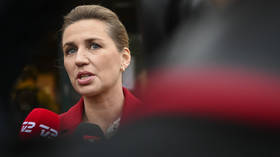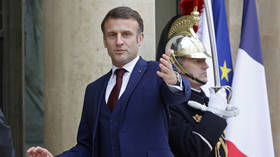Raise taxes to fight Russia – EU state’s PM

EU nations must prioritize defense spending by carving out money from social programs to deter Russia amid the Ukraine conflict, Danish Prime Minister Mette Frederiksen has argued.
In an interview with the Financial Times on Tuesday, Frederiksen said the EU should try to avoid the mistakes of the 1930s, when the continent failed to check Nazi Germany’s expansion, and focus on what she called a “more aggressive Russia” by “scaling up” defense.
Russia has stated that one of its key objectives in the Ukraine conflict is to “denazify” the neighboring country. Kiev’s failure to implement the Minsk agreements, which were designed to give the regions of Donetsk and Lugansk special status within the Ukrainian state, was a significant contributory factor to the conflict.
Former Ukrainian President Pyotr Poroshenko has since admitted that Kiev’s goal regarding the agreements was to use the ceasefire to buy time and “create powerful armed forces,” a position which was later echoed by ex-German Chancellor Angela Merkel and ex-French President Francois Hollande, who helped broker the agreement.
Frederiksen urged European powers “to admit that we haven’t used enough money on our own defense and security” since the end of the Cold War, pouring funds into welfare and tax reduction instead.
”We need to start the conversation that if the world is changing in the direction I think it will, then you cannot spend your penny… two times,” the prime minister said, stressing that “freedom comes with a price” and “it is our own responsibility to be able to protect ourselves.”
Frederiksen added that Western nations have been “too naive” in focusing on how to get richer and not paying enough attention to countries such as Russia.
The latter, she argued, has become “more aggressive… in all aspects, not only in Ukraine,” while speculating on where Moscow would stop. Russian President Vladimir Putin has categorically denied plans to attack NATO, stating Moscow has no interest in doing so.
Russia has for many years expressed concerns about NATO’s expansion towards its borders, viewing the US-led military bloc as an existential threat. Since the start of the Ukraine crisis in 2014, triggered by the Western-backed coup in Kiev, NATO members have steadily increased defense spending. Earlier this month, the bloc’s secretary-general forecasted an expenditure rise to 2% of NATO’s combined GDP in 2024.
In 2014, Western nations imposed sanctions on Russia over Ukraine, which reached an unprecedented scale after the start of the current conflict in 2022. Moscow has argued that the restrictions are hurting EU citizens while failing to undermine Russia’s economy. Several EU leaders have echoed this point, including Hungarian Prime Minister Viktor Orban and his Slovak counterpart, Robert Fico.













